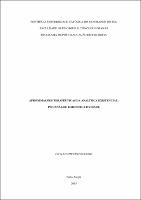| Share record |


|
Please use this identifier to cite or link to this item:
https://tede2.pucrs.br/tede2/handle/tede/6470Full metadata record
| DC Field | Value | Language |
|---|---|---|
| dc.creator | Gheno, Giovani Zwetsch | - |
| dc.creator.Lattes | http://buscatextual.cnpq.br/buscatextual/visualizacv.do?id=K4239891H6 | por |
| dc.contributor.advisor1 | Stein, Ernildo Jacob | - |
| dc.contributor.advisor1Lattes | http://buscatextual.cnpq.br/buscatextual/visualizacv.do?id=K4783928Z7 | por |
| dc.date.accessioned | 2016-01-25T17:10:00Z | - |
| dc.date.issued | 2015-12-10 | - |
| dc.identifier.uri | http://tede2.pucrs.br/tede2/handle/tede/6470 | - |
| dc.description.resumo | Esta tese tem como objetivo discutir a relação entre a analítica existencial do Dasein de “Ser e tempo” de Martin Heidegger e a psicanálise, tomada em geral como uma psicoterapia, considerando as possíveis implicações terapêuticas de uma fenomenologia hermenêutica e as possíveis implicações existenciais de uma teoria acerca do sofrimento humano. De início se busca esclarecer a exigência de um conceito de ser humano para esta comparação e também a conveniência de uma pormenorizada explicitação da metodologia que guiará o proceder teórico. São elencados alguns conceitos psicanalíticos e discutidos principalmente quanto à sua constituição estar condicionada por uma interação pessoal histórica e mundanamente determinada. A seguir, existenciais relevantes da analítica existencial do Dasein são trazidos um a um como contraponto às possibilidades de aproximação do seu surgimento e significado teórico com os conceitos psicanalíticos, mostrando que são todos irredutíveis e pertencentes a compreensões distintas da vida prática humana, ainda que possam ser significativamente complementares em uma tentativa de compreensão mais pormenorizada das existências autêntica e inautêntica do Dasein. Por fim, conclui-se que a analítica existencial do Dasein é uma compreensão da singularização que a compreensão do ser promove ao ser fenomenologicamente mostrada como modo de ser no mundo do Dasein e que isto não a qualifica para tratar pessoas em sofrimento, pois o sofrimento capaz de ser mudado e manejado em um encontro empírico é aquele devedor da historicidade de eventos pessoais representáveis apenas em teorias como a da psicanálise que se dão em remissão de conjuntação na significatividade do mundo e que promovem individuação inautêntica do Dasein na decaída. | por |
| dc.description.abstract | This thesis aims to discuss the relationship between the existential analytic of Dasein in “Being and time” by Martin Heidegger and psychoanalysis, taken as a psychotherapy, considering the possible therapeutic implications of a hermeneutic phenomenology and possible existential implications of a theory about human suffering. At first, it seeks to clarify the requirement for a concept of human being for this comparison and also the convenience of a detailed explanation of the methodology that will guide the theoretical proceedings. Some psychoanalytic concepts are listed and discussed mainly concerning its constitution being conditioned by a personal interaction which is historical and worldly determined. Next, relevant existentials from the existential analytic of Dasein are brought one by one as opposed to the possibilities of approaches of their emergence and theoretical significance to psychoanalytic concepts, showing that they are all irreducible and belonging to different understandings of human practical life, although they may combine significantly in an further attempt to a more detailed understanding of the authentic and inauthentic existence of Dasein. Finally, it concludes that the existential analytic of Dasein is an understanding of the singularity that understanding of being promotes when phenomenologically shown as a way of being-in-the-world of Dasein and that this does not qualify to treat people in suffering because the specific suffering able to be changed and managed in an empirical encounter is that one which is debtor to the historicity of personal events representable only by theories such as psychoanalysis that occur in remission of conjointy in the meaningfulness of the world and that promotes an inauthentic individuation of Dasein in fallenness. | eng |
| dc.description.provenance | Submitted by Setor de Tratamento da Informação - BC/PUCRS ([email protected]) on 2016-01-25T17:09:59Z No. of bitstreams: 1 TES_GIOVANI_ZWETSCH_GHENO_COMPLETO.pdf: 1160583 bytes, checksum: 7deab02421ee24575ec31f5ba7b9322d (MD5) | eng |
| dc.description.provenance | Made available in DSpace on 2016-01-25T17:10:00Z (GMT). No. of bitstreams: 1 TES_GIOVANI_ZWETSCH_GHENO_COMPLETO.pdf: 1160583 bytes, checksum: 7deab02421ee24575ec31f5ba7b9322d (MD5) Previous issue date: 2015-12-10 | eng |
| dc.format | application/pdf | * |
| dc.thumbnail.url | http://tede2.pucrs.br:80/tede2/retrieve/163991/TES_GIOVANI_ZWETSCH_GHENO_COMPLETO.pdf.jpg | * |
| dc.language | por | por |
| dc.publisher | Pontifícia Universidade Católica do Rio Grande do Sul | por |
| dc.publisher.department | Faculdade de Filosofia e Ciências Humanas | por |
| dc.publisher.country | Brasil | por |
| dc.publisher.initials | PUCRS | por |
| dc.publisher.program | Programa de Pós-Graduação em Filosofia | por |
| dc.rights | Acesso Aberto | por |
| dc.subject | FILOSOFIA | por |
| dc.subject | PSICANÁLISE | por |
| dc.subject | HEIDEGGER, MARTIN - CRÍTICA E INTERPRETAÇÃO | por |
| dc.subject.cnpq | CIENCIAS HUMANAS::FILOSOFIA | por |
| dc.title | Aproximações terapêuticas da analítica existencial : psicanálise e significatividade | por |
| dc.type | Tese | por |
| Appears in Collections: | Programa de Pós-Graduação em Filosofia | |
Files in This Item:
| File | Description | Size | Format | |
|---|---|---|---|---|
| TES_GIOVANI_ZWETSCH_GHENO_COMPLETO.pdf | Texto Completo | 1.13 MB | Adobe PDF |  Download/Open Preview |
Items in DSpace are protected by copyright, with all rights reserved, unless otherwise indicated.




